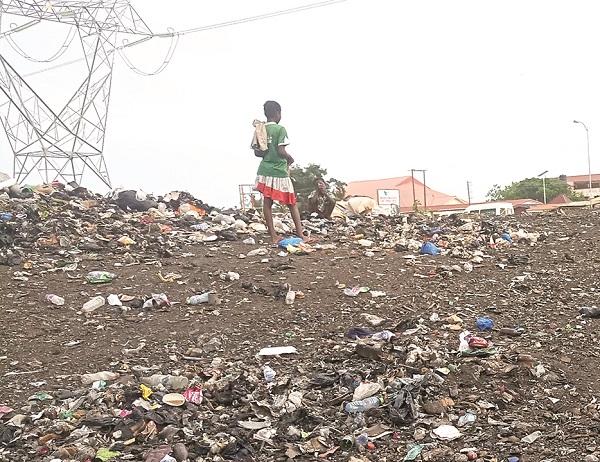
Refuse dump is bed of diseases... Stay away
Sifting through waste at dumping sites can put children at risk of harmful exposures, including pollutants such as smoke and heavy metals.
Also, they could get infections including diarrhoeal diseases and injury from sharp objects.
Youngsters have, therefore, been advised not go through or gather materials that have been discarded by other people to prevent them from harmful exposures.
A paediatric pulmonologist at the Komfo Anokye Teaching Hospital, Kumasi, Dr Sandra Kwarteng Owusu, said children were naturally curious and still in the process of discovering themselves and their environment, that being one of the reasons they wandered around refuse dumps.
She said children were completely oblivious of the dangers of visiting such sites and it was important that parents and care givers supervised them all the time.
Dr Owusu said children could be exposed to improperly disposed sewage, including faeces and rotten and contaminated substances at the dumping sites.
They might also be exposed to sharp objects such as broken bottles, plates and metals, she said.
Additionally, she said, they could be at risk of the harmful effects heavy metals such as mercury and lead and high concentration of smoke from burning materials, including electronic waste.
According to Dr Owusu, handling faeces and not washing hands could cause diarrhoea, vomiting and sometimes cholera.
She said at the dumping site, children might step on broken bottles and sharp metals which could result in deep cuts and put them at a high risk of tetanus.
Another problem, she said, was the handling of broken down electronic equipment and other substances which might expose them to heavy metal poisoning which, in some cases, might be linked to developing cancers.
She said other forms of chemical poisoning were also possible and so it was essential that children stayed away from refuse dumps.
Dr Owusu said the very high concentration of smoke likely to be inhaled at those sites could also have an effect on the breathing system of the body, even if it was for a brief period.
“Exposure to smoke and other pollutants can make some pre-existing diseases such as asthma worsen. Exposure to smoke has been linked to a high risk for developing pneumonia,” she said.
On what could be done to prevent children from visiting dumping sites, she said parents and caregivers should be educated on the risks and harmful effects of going to those sites.
She said the media also had a part to play by continuously hammering on the health hazards of such activities.
In school, she said, lessons on civic education should include such topics because when children were empowered, they would know that it was not appropriate to go to refuse dumps and play or pick up things.
She said in certain parts of the country, although children would have to carry rubbish every morning to the disposal site, they should not spend time there, adding that “they should dump and leave immediately”.
Furthermore, Dr Owusu said, there was the need to regulate where dumping sites should be situated they should ideally not be close to residential areas where children could easily walk around and access them.
She said dumping areas must be protected with barriers, so that children would not have direct access to them.
She noted that in this era of Covid-19 when people were improperly disposing of nose masks, children might go to those sites and pick them up and the consequences might be dire.
For his part, a retired Assistant Chief Technical Officer of the Disease Control Unit of the Ghana Health Service, Mr Ebenezer Tetteh, said one of the main aims of children sifting through waste was to identify and select items that they deemed as valuables for personal use or to sell.
He said poverty was the underlying factor for some children who did that because children of affluent parents were not seen at refuse dumps.
He explained that there were particular infections or disease conditions which were contracted mostly at refuse dumps.
He gave an example as intestinal worms and explained that the eggs of the worms were scattered all over refuse areas and when children went through waste, they might pick some of the eggs which are very minute and cannot be seen with the naked eye.
He said such children did not observe hygienic practices and did not wash their hands before eating, and by so doing, they transmitted the eggs they picked from the refuse dump into their system.
Another worm he mentioned is the hook worm, which passes through the skin into the body.
He said when children visited dumping areas barefooted, the larvae of the worm could penetrate the sole of their feet into their bodies.
Mr Tetteh said if refuse was disposed of properly, there would be no way children could gain access to the sites and appealed to the government to enforce laws on the indiscriminate dumping of refuse.
